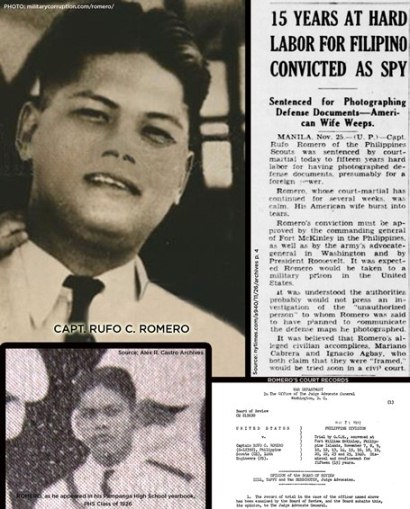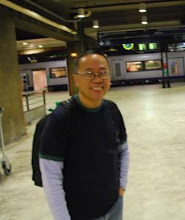 |
| Capt. RUFO ROMERO, convicted military spy, Kapampangan |
In late November of 1940, a West Point graduate was convicted of espionage-- at that time, the first and only alumnus of the prestigious United States Military Academy to be court-martialed and charged for attempting to sell classified maps to Japan, via an intermediary. The military officer, Rufo C. Romero, also happens to be a Kapampangan, the illegitimate son of a poor woman with an unknown partner, who, some tongue wags say, was a priest.
Nevertheless, Romero grew up an intelligent child, finishing his secondary education at the Pampanga High School, class of 1926, where he was also a top Cadet Officer. However, it was at the University of the Philippines that his brilliance showed, leading to an appointment at West Point. He graduated in 1931 with flying colors, ranking 17th in his class—an incredible feat for a Filipino who, lumped with African-Americans, were considered as minorities.
Armed also with a civil engineering degree from the University of California, Romero seemed bound for an illustrious military career. He found love in the U.S., marrying 17 year old Lorraine Becker of Bronx, New York, before being sent back to the Philippines to serve as captain to the Philippine Scouts.
The commander of the Philippine Scouts 14th Engineer Regiment recalls that Capt. Romero was among the U.S. Army's most knowledgeable experts on the topography, road and trail network and defensive positions on Bataan.
Romero would also have known the value of such information to the Japanese and other foreign powers even long before the 1941 Philippine invasion ; there have been several cases in the past where confidential fortification blueprints of Corregidor and Bataan where stolen, lost, or copied, clearly for use in military espionage. There was circumstantial evidence to suggest that Romero could very well be a spy, thus, a sting operation was hatched by the U.S. Army to entrap him.
The Army drew up a plan where a supposed Japanese-colluding Mindanao sultan was out on the market looking for such maps and classified documents. Romero, along with alleged civilian accomplices Ignacio Agbay and Mariano Cabrera, had photographed copies of Corregidor and Bataan defense maps, which the captain then attempted to sell for $25,000.
It was in this dramatic way that Romero was arrested, and court-martialed at Fort McKinley in November, 1940. By the 24th, he was found guilty of giving secret maps related to national defense to unauthorized persons, a violation of the Articles of War 96.
Professing his innocence, he volunteered to undergo any kind of brain operation that would erase his memories and recollections regarding military matters, a last-ditch effort to save his tarnished reputation. Romero was dishonorably discharged, lost all his pay allowances, and sentenced to 15 years of hard labor at McNeil Island Penitentiary in Washington State. His wife, Lorraine, who had connived with him, was not charged.
After Romero served his time in prison, he left the United States to build a new career in the academe back in the Philippines. He taught engineering subjects at the National University in Sampaloc, Manila, where students remember him as an amiable professor who likes engaging people in friendly conversations. Further distancing himself from his past, he went to Africa and Spain, where his tainted reputation was relatively unknown, and found some engineering jobs.
All this time, his notorious deed led his many fellow Filipinos to ask: what makes a man of intelligence become a spy? What drives him to become a betrayer of his country, his family, and conscience? The world will never know as Rufo C. Romero passed away in Spain on 3 January 1985, leaving behind his wife and 3 children in the U.S., remaining quiet about this one act of treachery that changed the course of their lives.
SOURCES:
Scott Harrison;s Espionage Page:
https://corregidor.org/crypto/chs_crypto1/sting1.htm
West Point grad convicted for attempting to sell maps of
fortifications to a foreign power: https://militarycorruption.com/romero/
Time Magazine: The Philippines: Spy Trial, 2 December 1940
Board of Review Holdings, Opinions and Reviews,
https://books.google.com.ph/






7 comments:
He was really lucky to have had a second chance at life. To tell the truth I thought he was gonna get killed. There could be a whole lot of reasons about how someone could possibly betray his nation, family, and conscience, but in this man's case, it was obviously seeking wealth. And we humans are not very good with possessions - we have the tendency to be the ones being possessed instead of being the ones possessing. And this story seems to prove that. However, it is heartwarming to read how he was able to spend the rest of his life - like a redemptive story to a rather broken past.
I admire your writing, Sir! I'm glad I stumbled upon your blogs.
Btw, the brain operation's a cool idea lol
I thought so too!!! A lobotomy would have done the job.
In this article, you shared very cool ideas with us. I love your thinking sense. I am very glad to read this. Thankyou for sharing with us. Now its time to avail Limo service West Palm Beach for more information.
I thoroughly enjoyed reading your insightful blog post titled "448 Capt. Rufo C. Romero: How Kapampangan Cuisine Celebrates Heritage. Promo Code Hq, a leading online platform, offers exclusive discounts and deals on various culinary products!
Thank you for consistently providing valuable insights into the world of food and culture. I'm eagerly looking forward to your future blog posts. Try out frugalishness for get amazing discount.
This article is quite interesting and I am looking forward to reading more of your posts. Thanks for sharing this article with us.
help with business assignment
Post a Comment